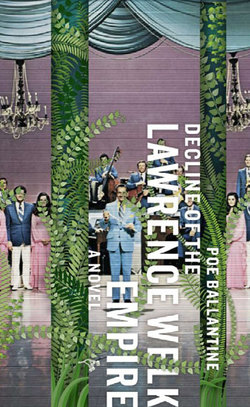Читать книгу Decline of the Lawrence Welk Empire - Poe Ballantine - Страница 22
На сайте Литреса книга снята с продажи.
Оглавление14.
IN THE MIDDLE OF THE NIGHT I WAKE UP SEIZED BY asthma. I have not had an attack like this since I was a child. It feels as if an octopus has mistaken me for a mollusk. I have no medication. I walk outside in the dark and try to recover my breath on the front steps. The air is so thick and wet you have to be a fish to get the oxygen out of it. The insects scream and the frogs, like half-witted sidekicks, cheer gar – rup gar – rup. I glance to the jungle and understand that the cause of the attack is fear.
In the morning I crush my package of cigarettes into a ball and drop them with a satisfying plunk into the metal trash can. I am a natural man now with no use for dirty habits. I wander down through town again, feeling more futile and alien than ever. The sense of not belonging here is now overpowering. Around noon, I return to the bar called Harry’s, hoping to find Mountain. I take a stool next to a jewel-decked woman in a sailor suit and sneakers, who ignores me, and order a bottle of beer. A red-legged, potbellied man in a pith helmet down at the end is bragging about a thirty-pound wahoo. Through the tinted window all the sails of the boats in the bay are pink. A television is snowing green up in the corner next to the stuffed remains of an enraged-looking fish in the form of a spiked balloon. An unruly blue parrot squawks from the top of the door, through which everyone on the island appears to pass except Mountain. There are ships’ emblems and cricket plaques all over the walls. I study a framed verse from my father’s era:
I’M NOT DRUNK.
Starkle, Starkle little Twink, Who the hell you are I think I’m not as drunk as some Thinkle peep I am Besides I’ve only had ten martonis And anyway I’ve got all day Sober to Sunday up in. I fool so feelsh, I don’t know Who’s me yet But the drunker I sit here The longer I get.
I nurse two more frosty bottles of Red Stripe than I can afford, glancing at the door every forty-five seconds, certain that Mountain will appear. No one speaks to me or asks me of my whereabouts or intentions. Not a soul yet except for Alvin in his taxicab has endeavored to make me feel welcome. I’m certain it’s my mood, combined with my class, and I know I am giving off these I-don’t-belong rays. Finally I tear myself away to go sit in the plaza again under the mahogany trees, where I know Mountain has just passed after picking up supplies and has returned for the month to his tepee on the remotest part of the island. I congratulate myself because I’ve quit smoking for good, but then I feel depressed because I have $178 and I am an imbecile. I watch the ferry dock and unload its glazed cargo. The white people who live here are the least friendly of all the residents and I make it a point not to be numbered among them.
Two unmarked roads intersect the middle of town. I have time to kill but I don’t want to take the road that will return me to Gladys Hooks’ before it disappears into the forbidden forest, the Road Less Traveled for a Jolly Good Reason. Eventually I’ll have to take this road, I know, which will one day soon lead to loincloths, roasted wild piglets, and sweet, barbarous freedom. But for now I follow the crowd up the safe tourist route lined with shops, restaurants, a nightclub, a bakery, and a vulgarity called Saul Schwartz’s Rent-a-Thing, silver-and-green tinsel and colored plastic banners flapping from twine strung between light posts. “Things” are all-terrain convertible Volkswagens, squarish and military-looking, manufactured in Brazil. A man wearing a Saul Schwartz Rent-A-Thing T-shirt with a palm tree on it sits across the street on the shady deck of a fancy, driftwood Swift-Family-Robinson-theme restaurant sipping on a Heineken. I think it must be Saul himself, for who else would wear such an obnoxious shirt? I have no great admiration for Rent-a-Car men, but sitting on the patio of a driftwood club carelessly watching the sailboats and sipping a Heineken seems exactly the right thing to be doing. Two jovial young native men in flip-flops nod at me. “Ah right,” they say, with a bob of the head as they pass. The natives say “ah right,” coming or going, hello, good-bye, how ya doin’, thank you, or I’m just fine. It’s a bigger word than Aloha. “Ah right,” I answer back. And then all the way up the hill I am saying, “Ah right” and feeling a little less out of place.
Nearly two miles up the road (ah right ah right) is the Rockefeller Plantation, off limits to the poor unless you are entering uniformed through the back door. I am amazed that they have the nerve to call this resort a “plantation.” It must be staffed 90 percent by blacks, ex – slaves still working the plantation. I turn on my heel and trudge back toward home. Where is paradise? I wonder: the fruit trees, the beach huts, the self-sufficiency, the smiling, carefree natives, the rejection of four-slice toasters and Best Western values? No wonder Mountain doesn’t live in town. He is in a cave on the beach, seminomadic, fishing and eating red bananas and studying his treasure maps. I tell myself with darkening, deepening doubt that I will find him and he will reveal to me all the answers.
